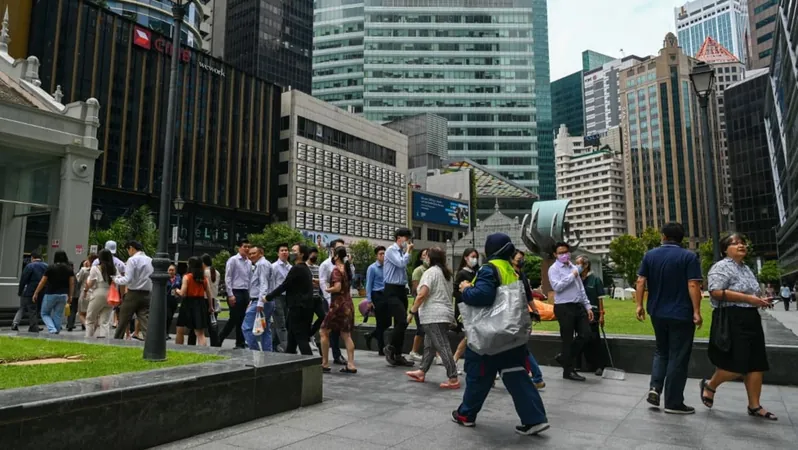
Singapore's Economic Growth Projected to Thrive on Global Tech Surge in 2025: Insights from MAS
2024-10-28
Author: Mei
SINGAPORE: The Monetary Authority of Singapore (MAS) has shared an optimistic outlook for Singapore's economy, indicating that growth in 2025 will likely mirror this year’s performance. According to MAS’s latest half-yearly macroeconomic review, the expansion of the economy will be fueled by a significant upswing in the global technology sector, alongside improving financial conditions.
This year, Singapore is anticipated to grow at the upper echelon of the forecast range of 2% to 3%. MAS emphasized that the trade-related and modern services clusters will primarily bolster GDP growth in both 2024 and 2025.
The report paints a “generally sanguine” picture for global trade, forecasting that the recovery in technology will extend beyond artificial intelligence (AI) infrastructure to include consumer technology products. As companies accelerate their digitization efforts, the heightened adoption of AI is expected to bolster the information and communication industry.
Support from the global monetary policy easing is likely to benefit Singapore's financial sector. Fund managers are witnessing a rise in assets under management, reflecting a growing interest from international investors in the Asian market.
Strong Manufacturing Recovery in Q3
Singapore's economy recorded a striking rebound in the third quarter of this year, with an advanced GDP estimate of 4.1%. Notably, this growth outpaced the pre-pandemic average, with nearly 60% of industries reporting above-average growth between July and September.
The resurgence is largely attributed to revitalized external sectors alongside a robust recovery in manufacturing. Increased financial trading activity, coupled with a surge in Chinese tourist arrivals, has significantly contributed to the economic uplift.
Every manufacturing cluster registered output growth in Q3, with the electronics sector leading the charge at a remarkable 15.4% increase compared to the previous year. The biomedical sector also marked a significant comeback, growing by 8.8% after experiencing ten consecutive quarters of decline.
The financial sector has benefited from heightened market activities and volatility, prompting investors to rebalance their portfolios amidst global market gyrations. Furthermore, tourism-related industries have thrived thanks to a remarkable 56% increase in Chinese visitor arrivals, accounting for nearly two-thirds of the rise in total arrivals. Consequently, hotel occupancy rates improved markedly from July to August, spurred by longer stays from Chinese tourists.
Caution Ahead: Geopolitical Risks
While the outlook for 2024 appears secure, MAS warns of potential downside risks in 2025. Factors such as escalating geopolitical tensions, trade disputes, and a slowdown in Chinese economic growth pose significant threats to Singapore's economic prospects. The upcoming presidential elections in the United States and ongoing tensions in the Middle East could further complicate the landscape.
The stability of the tech-led recovery remains a point of uncertainty, particularly as it might be contingent on broader aggregate demand dynamics.
Inflation Trends & Expectations
In terms of inflation, MAS forecasts that core inflation, which excludes costs for accommodation and private transport, will stabilize around 2% by the end of this year. However, seasonal demand may lead to a slight uptick in inflation during the final quarter, though the overarching trend is expected to continue declining.
Revised public healthcare subsidies are anticipated to aid in reducing inflation for essential services, complemented by lower crude oil prices relative to last year. Short-term inflation is likely to remain in check, with major goods-producing economies currently exhibiting weakness.
MAS also forecasts that both core and headline inflation will average between 1.5% and 2.5% next year, particularly as the impact of recent goods and services tax hikes dissipates. Nonetheless, any significant downturn in the global economy due to geopolitical tensions could lead to a sharp and widespread price decline, subsequently lowering domestic inflation rates beyond current expectations.
As Singapore looks toward 2025, balancing growth potential against external risks will remain a key focus for policymakers and investors alike.


 Brasil (PT)
Brasil (PT)
 Canada (EN)
Canada (EN)
 Chile (ES)
Chile (ES)
 España (ES)
España (ES)
 France (FR)
France (FR)
 Hong Kong (EN)
Hong Kong (EN)
 Italia (IT)
Italia (IT)
 日本 (JA)
日本 (JA)
 Magyarország (HU)
Magyarország (HU)
 Norge (NO)
Norge (NO)
 Polska (PL)
Polska (PL)
 Schweiz (DE)
Schweiz (DE)
 Singapore (EN)
Singapore (EN)
 Sverige (SV)
Sverige (SV)
 Suomi (FI)
Suomi (FI)
 Türkiye (TR)
Türkiye (TR)